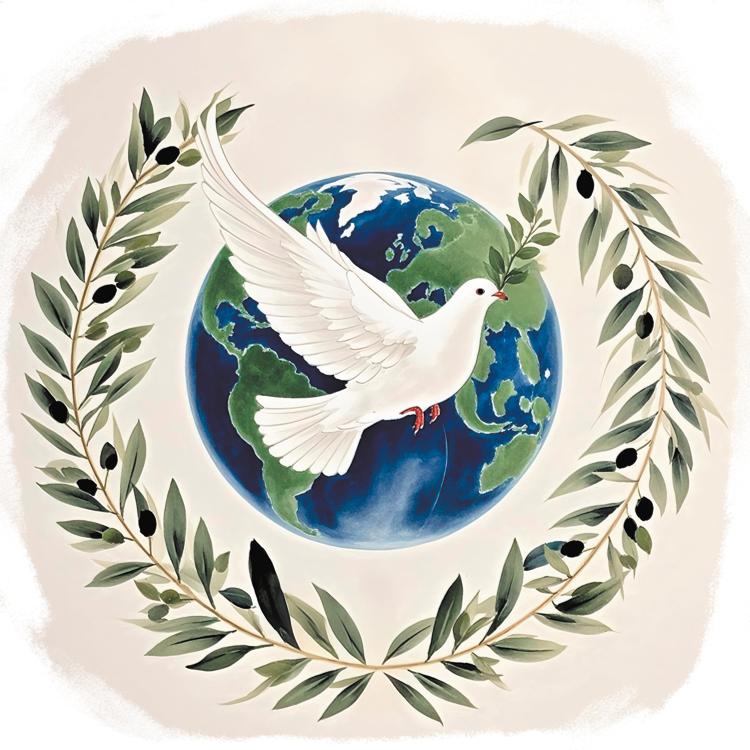Fallacy of 'Pax Americana'
West's actions starkly betray their grandstanding as upholders of the founding principles of the postwar order


Russia commemorated the 80th anniversary of victory in the Great Patriotic War on May 9. Among the major allied powers of the anti-fascist war, China was the sole participant in this ceremony. This moment will be etched in history — a stark testament to how the founding principles of the United Nations Charter forged in the war's aftermath are no longer upheld as universal values by some Western countries.
What values, then, do the Western nations that chose to absent themselves from this occasion truly uphold?
Observing Europe and the United States' tacit approval — even support — of Israel's continued military operations and "preemptive "attacks in the Middle East, the racist and Islamophobic nature behind their stance stands fully exposed. As the US persistently frames China's rise unilaterally as a threat while trampling on market principles and the concept of sovereign equality, it reveals a clear logic of Western ethnocentrism.
In the immediate aftermath of World War II, Western nations themselves similarly championed the construction of a peaceful international order. Established in October 1945 under the leadership of the US and the United Kingdom, the United Nations enshrined its Charter as the cornerstone of the postwar order — an instrument explicitly designed to rectify the failures of the League of Nations and ensure no more wars of aggression. Recently, when numerous countries condemned Israeli and US "preemptive" military strike against Iran, they invoked precisely these foundational principles of the UN Charter and international law.
A survey of the early postwar global landscape reveals that characterizing this era as a "Pax Americana" constitutes a significant historical oversimplification. We must clearly acknowledge that since the Cold War's inception, the US-led Western bloc has adeptly alternated between two distinct personas: the "Western-centric colonial framework" and the self-styled "guardians of liberal democratic peace".This meticulously crafted double standard has permeated the entire process of building the international order.
The nations subjected to this double standard first voiced their dissent and launched collective action at the Bandung Conference in April 1955. These newly independent states recently liberated from imperial subjugation and Japanese colonial aggression, boldly asserted their commitment to ending colonialism, abolishing racial discrimination and building just and equitable international relations — distinct from Western-centric frameworks.
While the Declaration on Promotion of World Peace and Cooperation adopted at this conference gained wide recognition, the newly independent nations were not, in reality, a monolithic bloc. Cold War divisions had already permeated Asia-Africa relations, with the US leveraging pro-US Asian states to contain the so-called communist "infiltration". Washington feared that the Five Principles of Peaceful Coexistence might gain sufficient traction to spark calls for US disengagement from Asia.
The US deliberately obstructed the conference process, fundamentally aiming to stifle China's ability to secure widespread recognition within international institutions. The US strategy positioned China's Taiwan island as a geostrategic salient in its systemic containment of socialist states. In pursuit of this, Washington unhesitatingly resorts to interfering in China's internal affairs. The Bandung Conference, initially conceived to promote colonial liberation and foster equitable international ties, was weaponized by the US to legitimize its blockade against China. Despite the US grandstanding as a defender of the "principle of national self-determination", its actions starkly betrayed a reality: Colonialism has never been viewed by Washington as a historical cancer that must be rooted out.
In this critical juncture, former Chinese premier Zhou Enlai emerged as the pivotal figure who redirected the conference from divisive trajectories toward forging a shared consensus. The Bandung Conference was a platform for unity over confrontation, demonstrating pragmatic statesmanship through adhering to the Five Principles of Peaceful Coexistence while avoiding rigid formulations. Zhou's stance of negotiated restraint decisively countered pro-American narratives alleging "socialism as a new form of colonialism". Ultimately, the conference adopted the Declaration on Promotion of World Peace and Cooperation, which explicitly condemned "all forms of colonialism", amplifying the voices of colonized peoples still striving for independence. The triumph of Zhou's diplomatic philosophy — that states with other ideologies could achieve mutual understanding — laid the groundwork for China's subsequent diplomatic outreach focused on Afro-Asian nations.
The US and its allies' undermining of the Bandung Conference revealed fundamental value conflicts with Asian and African nations. They prioritize maintaining the US dominated hierarchical system over establishing a new international order based on equality and mutual benefit. Also, they are keener on stripping countries of their right to choose diverse development paths than reckoning with colonialism's historical sins.
The world's inability to unite to prevent the humanitarian catastrophe in Palestine makes revisiting the United Nations Charter the profound core of commemorating the 80th anniversary of the victory over fascism. The Bandung Conference's appeal seven decades ago to surpass Western centrism and create an equal and mutually beneficial international order still guides humanity forward.

The author is an associate researcher at the School of Humanities at Shanghai Jiao Tong University. The author contributed this article to China Watch, a think tank powered by China Daily. The views do not necessarily reflect those of China Daily.
Contact the editor at editor@chinawatch.cn.


































